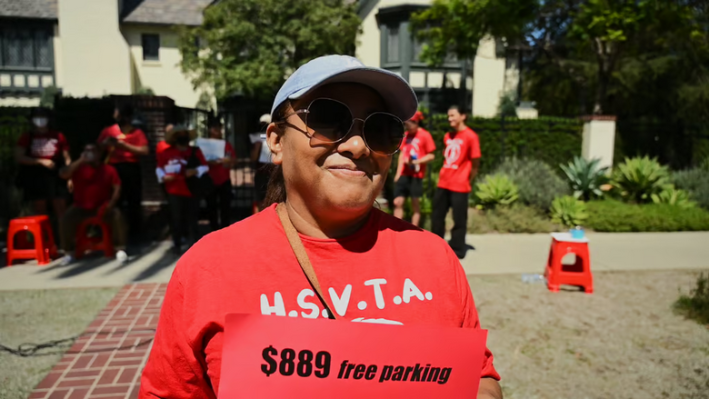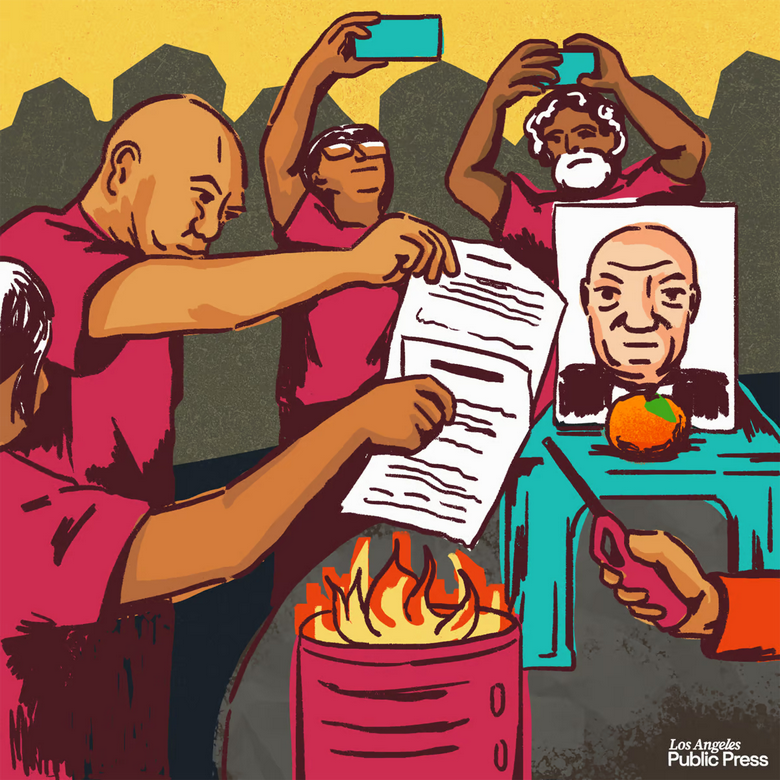This article was first published by the nonprofit newsroom L.A. Public Press, and is republished here with permission.
This is an introduction to LA Public Press’ new investigative podcast, The Tenant Association. Listen to the story about the tenants of Hillside Villa, a group of Chinatown resident facing displacement who organized and became a political force that’s changing what’s possible for renters in LA. Listen wherever you get your podcasts.
Monica Ruiz was taking out the garbage when she saw a piece of paper attached to her door. It was a notice that her building’s affordability covenant had expired — a contract that kept her rents low for the entire time she was living in her apartment.
Monica has lived at Hillside Villa for 25 years. It’s a 124-unit apartment complex that sits on a hill overlooking LA’s Chinatown neighborhood. The building’s residents are mostly working-class tenants like her. Many have raised families there, able to do so close to the heart of Los Angeles because of the building’s affordable rents, kept affordable through government rules. Plus, Hillside Villa is one of the relatively few apartment buildings with large two and three-bedroom apartments. It has an expansive courtyard where people can gather and children can play.
But the notice that Monica and her neighbors received prophesied all of that coming to an end. In 2018, their landlord Tom Botz tried to raise their rents by thousands of dollars — increases that are tantamount to an eviction notice for these tenants.

Monica’s youngest daughter was 15-years-old at the time, and distraught about having to possibly move. She had been taking Mandarin Chinese classes sinListen to the Tenant Association now, wherever you listen to podcasts. Illustration by Alyson Yee.ce she had attended kindergarten at Castelar Elementary School, just down the hill from Hillside Villa. She didn’t want to leave her friends.
“I didn’t know how to explain it to her, I just said, ‘No, we aren’t going to move,’” Monica said in Spanish. “But I told myself, ‘I don’t know what’s going to happen.’”
A Nationwide Problem
Hillside Villa, like a lot of apartment buildings, was built using public money. That includes multi-million dollar loans from the city of Los Angeles, and tax credits from the federal government. In return, the original developer agreed to rent to low-income tenants, and restrict their rents based on their income level, for 30 years. The terms were laid out in a contract he signed at the time, often referred to as an “affordability covenant”.
Politicians like President, and one-time California Governor, Ronald Reagan championed subsidies and covenants as a way to get the government out of the housing business. They painted public housing as “communist” and “anti-American,” and successfully advocated for policy solutions that, they said, incentivized the private sector to build affordable housing.
But that led to a temporary solution to a permanent problem. Hillside Villa isn’t the only apartment complex where an expiring covenant threatens to displace relatively poor tenants from stable housing. Across the country, more than 800,000 apartments will lose their affordability restrictions in the next 10 years.
This is a crisis across the entire country.
It’s set the stage for millions of households across the United States facing the precise dilemma that Monica Ruiz faces. Struggle to pay a rent that they couldn’t afford, or move out.
But to where? Rents are high everywhere, and some tenants would have to move far away from their communities. Some could even become homeless. For a fixed-income senior, the stakes are very real.
At the end of 2018, the building’s owner Tom Botz, his daughter Chloe, and the then-property manager offered tenants cash payments of several thousand dollars to leave, not long after delivering the rent increase notices. Tenants recounted how Chloe Botz and the manager would go door-to-door, trying to get the tenants to take these payments.
“It’s like they thought, ‘these people are low income and will accept whatever we offer because they don’t know their rights, they’re ignorant and are going to accept what we tell them.’ They tried to instill fear in us,” Monica said.
Tenants Fight Back
Some did take the payments, but others decided to fight back. Luisa Ramirez was another longtime tenant at Hillside Villa. Her daughter Nancy recalls that when they received the rent increase notice, Luisa was “scared, very scared.” But that fear gave way to defiance against the landlord.
One thing led to another, and soon, Luisa, Monica, and others had formed a tenants’ union they called the Hillside Villa Tenant Association. It comprised 60 households, all threatened with displacement by a landlord taking advantage of expiring affordability covenants.
Luisa and her friends — like Monica Ruiz — were the backbone of the association. They were mainly Spanish-speaking women who raised families at Hillside Villa. Most realized that it would be hard for them to find another place to live and that together, they had the power to fight their landlord over these rent increases.
LA Public Press Presents: The Tenant Association
The Hillside Villa Tenant Association has been fighting to save their housing for six years. Now, LA Public Press is publishing a podcast series that centers the tenants and chronicles the ups and downs of that struggle.
Most people, when faced with a rent increase or eviction notice, opt to move out; the so-called “voluntary eviction.” They’re afraid, or don’t know how to push back on their landlord. But the Hillside Villa tenants stayed and fought for years. They have inspired other tenant associations throughout LA County and even abroad.
My name is Phoenix Tso, and I’ve been covering the Hillside Villa fight for two years. And I’ve worked this whole year with the LA Public Press team to put together this podcast, which combines original interviews, archival footage, and hundreds of pages of public records into an immersive, investigative podcast on one of LA’s most influential housing movements, and how we can truly center tenants in tackling our cities’ housing crises.







